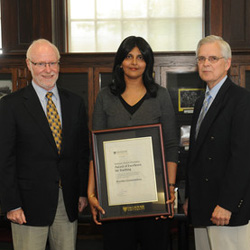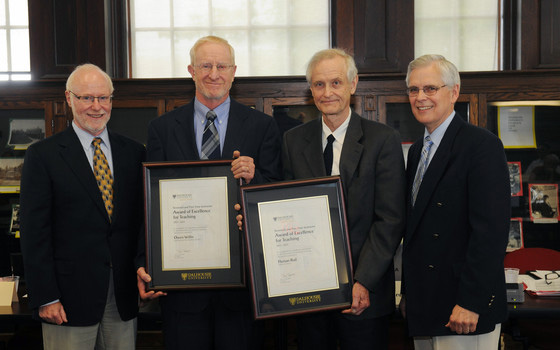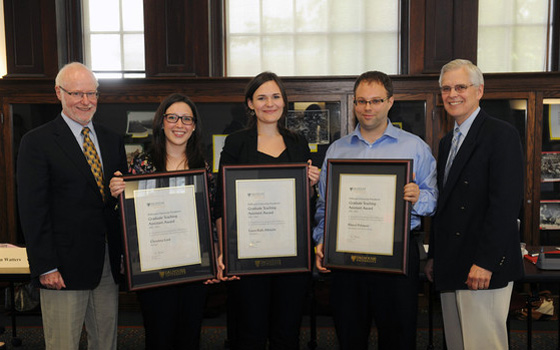Arunika Gunawardena says sheãs ãhumbledã to receive the universityãs top award for teaching.
Dr. Gunawardena, an associate professor in the Department of Biology, is the 2013 recipient of the Alumni Association Award of Excellence for Teaching. Established in 1979, itãs presented annually to the professor who, in the eyes of his or her students and peers, has displayed the qualities of superior teaching, enthusiasm for the subject, and interest in the needs of students.
ãWe are really fortunate to have such a dedicated, hands-on professor who is always there for [us] when we need help,ã says Adrian Dauphinee, a PhD student who works with Dr. Gunawardena. ãIt makes a huge difference.ã
ãShe just wants you to succeed,ã adds Angelica Camillo, a fourth-year undergraduate student. ãShe does anything in her power to make that happen.ã
Asking the right questions
Dr. Gunawardena, whose research focuses on programmed cell death in plant development (), is no stranger to acclaim: in addition to a Faculty of Science Killam Prize for her research in 2011/12, she received a DSU Teaching Excellence Award in 2011 and, earlier this year, an Outstanding Graduate Advisor Award.
Dr. Gunawardenaãs secret? The love and kindness she shows her students, treating them as equal partners in their education. Using grassroots methods of communication and implementing an open-door/open-house policy, Dr. Gunawardena puts her students at ease, something she says results in ãhigher productivityã and more smiles in the classroom.
She sees teaching as a reciprocal relationship.
ãI think I can learn from my students too, from their questions and observations. Sometimes itãs unbelievable the type of amazing questions that they ask.ã
That questioning environment is a critical component of her classroom.
ãBefore I start my lecture I ask if they have questions from the previous class. If they say no, then I say ok, well I have questions [for them]. And this is how they become engaged and slowly develop the confidence to start asking questions. Thatãs the part I love.ã
Putting herself in the studentsã shoes
Dr. Gunawardena teaches two plant biology classes: a larger second-year class and a more intensive fourth-year plant cell biology class that is cross-listed with a graduate level class. She takes the time to try and put herself in her studentsã shoes in order for them to succeed and to understand what they're learning.
 ãIf itãs a second-year lecture, I have to stop and pretend to be a second-year student and then I think to myself, ãDo I understand?ã and then I will structure my lecture in a certain way,ã she says. ãI always tell my students that the teacher can only be happy if the majority of the students can gain something they can take with them. One PowerPoint lecture (1 hr) can take up to eight hours to make at the beginning, so I have to make sure they can take something away from it.ã
ãIf itãs a second-year lecture, I have to stop and pretend to be a second-year student and then I think to myself, ãDo I understand?ã and then I will structure my lecture in a certain way,ã she says. ãI always tell my students that the teacher can only be happy if the majority of the students can gain something they can take with them. One PowerPoint lecture (1 hr) can take up to eight hours to make at the beginning, so I have to make sure they can take something away from it.ã
So how does Dr. Gunawardena make plants interesting to her students? She is realistic about the probability of interest in the subject itself.
ãIf you asked my second-year class, less than one per cent would like to pursue careers in botany. If you ask if they want to be doctors, over 70 per cent will say ãyes!ãã
Keeping students engaged
Dr. Gunawardena empathizes with her students, admitting that she wanted to be a doctor herself. ãThat didnãt work out, but my father pointed out to me that I could be a different kind of doctor.ã While working on her undergraduate degree, she also met an inspiring professor that was engaged in plant biology research, and this piqued her interest. She wants to excite her students in a similar fashion.
ãI have to make my lectures interesting so students can get excited. I speak about my own work, show video clips and lots of images. I also show them work that my students have done. I try to present a lot of practical implications too.ã
Dr. Gunawardena has high expectations for her students and as a result many have gone on to win awards, and continue to pursue their education beyond the undergraduate level. ãI ask them to work hard and it usually works out pretty well. Many of my students are now in medical school, law school, dental school and graduate school, etc. They are doing really well and I am very proud of my students.ã
ãTeaching is such a rewarding experience,ã she concludes.
Dal Teaching Awards
In addition to the Alumni Association Award, teaching excellence awards were presented in two other categories at the June 10 meeting of the ¿«§ÇòÆóç Senate:
Sessional and Part-Time Instructor Award of Excellence for Teaching

Florian Bail (Department of Political Science) has been a sessional instructor at ¿«§ÇòÆóç for over 25 years. In that time, heãs served as a supervisor for around 30 honours students and five MA theses, and his colleagues state that he is ãstriking in his breadth of knowledge, and demonstrates an enthusiasm for learning that he passes onto his students.ã
Owen Willis (International Development Studies) has taught at Dal for more than a decade. Heãs helped develop innovative new courses such as Africa: An Introduction and Development as Happiness and was also instrumental in the departmentãs Africa Field School ã a six-week course for which he travelled with students to various areas in East Africa. He has also served as the IDS graduate co-ordinator and acting director of the Students for Development Program.
President's Graduate Teaching Assistant Award

Christina Lord (Department of Biology) has been a teaching assistant since 2008. She has consistently garnered accolades from her students, fellow teaching assistants and supervisors and professors. She has taught in at least ten different courses and her supervisors find her to be an exemplary educator, taking the time to go above the call of duty to help students with their labs and coursework.
Laura Ruth Albrecht (Department of Chemistry) is a research assistant supervisor who has been teaching with the Organic and Introduction to Chemistry groups with great success. Lauraãs practical experience in the field of chemistry, combined with her academic prowess, has made her an indispensable member of the teaching team in the department.
ä»
Marcel Peloquin (Department of Psychology and Neuroscience) has provided teaching assistance to many courses, provided workshops on many topics from mindfulness and sleep, to graduate school preparation, and many students say his tutorials are the highlight of the course.

